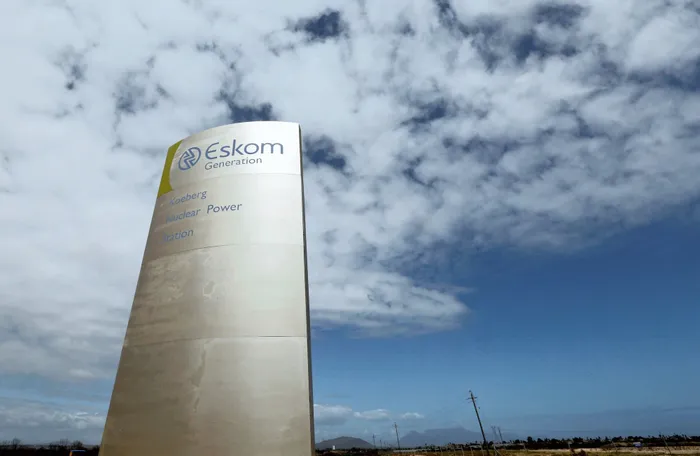
Eskom has received environmental authorisation to proceed with the construction of the 4 000 megawatt (MW) power station in Duynefontein, near the Koeberg Nuclear Power Station in the Western Cape.
Image: Mike Hutchings/Reuters
Banele Ginidza
The South African Nuclear Energy Corporation (Necsa) has voiced robust support for Eskom's plans to initiate the construction of a new nuclear power station in Duynefontein, situated adjacent to the Koeberg facility.
This initiative signifies a critical move towards enhancing South Africa's energy security and is set to adhere to the highest standards of safety, environmental protection, and regulatory compliance, as previously demonstrated by Eskom at the Koeberg nuclear power plant.
Necsa is keen on expanding its role in nuclear fuel manufacturing and, in April, signed a Memorandum of Understanding (MoU) with the China National Nuclear Corporation (CNNC).
In this context, the organisation on Monday welcomed the Minister of Forestry, Fisheries and the Environment (DFFE), Dion George’s announcement that Eskom has received environmental authorisation to proceed with the construction of the 4 000 megawatt (MW) power station in Duynefontein, following a successful appeal against an earlier decision issued in 2017.
This announcement unlocks the pathway for Eskom to secure several essential statutory authorisations.
These include a Nuclear Installation Licence from the National Nuclear Regulator (NNR), approval from the National Energy Regulator of South Africa (Nersa), and a water use licence from the Department of Water and Sanitation, alongside various other approvals from the Minister of Mineral and Petroleum Resources.
"This approval marks an important milestone for the nuclear industry and South Africa’s journey towards implementing a balanced energy mix that enables socio-economic development and is climate friendly," said Necsa CEO, Loyiso Tyabashe.
"The Minister’s decision shows rigour of the process that was followed to choose an appropriate site for nuclear new build and reflects confidence in nuclear technology as a safe, clean, and reliable energy solution."
Tyabashe said nuclear power remained a crucial component of South Africa’s baseload energy mix, and part of the government's strategy to reduce greenhouse emission.
"Necsa supports initiatives that reinforce the use of nuclear technology and its applications for power and beyond power for peaceful means and development," Tyabashe said.
"Necsa continues to work with the Department of Electricity and Energy as well as Eskom as a partner and commits to contribute its technical expertise to maximise the benefits of nuclear energy."
In addition to expanding its role in nuclear fuel manufacturing and intergrating small modular reactors (SMRs) into South Africa's energy plans, Necsa is also pursuing a R60 billion nuclear build programme.
Environmentalists and civil society advocates are objecting to the decision to uphold Eskom's 2017 environmental authorisation, particularly due to reliance on outdated Environmental Impact Assessment (EIA) studies, which raised alarms about the risks posed by high seismic activity and dense human populations in the area.
In reaction to this announcement, Koeberg Action Alliance (KAA) spokesperson Peter Becker described the decision as a surprise, adding that civil society will be meeting to discuss the options.
Becker said as the EIA process was started in 2007, and so much has changed since then, including population density, and the cost of alternatives, thus it was not rational to ignore these changes in the environment of the proposed plant and to base such a crucial decision on thoroughly outdated studies.
"It is of note that the EIA consultants found that Duynefontein (Koeberg) was not the best site for a new plant, due to seismic risks and population density in the area," Becker said.
"It appears the DFFE has been pressured to override the consultants' view due to economic factors. It is of course far cheaper to build a new plant where there is already existing infrastructure."
BUSINESS REPORT